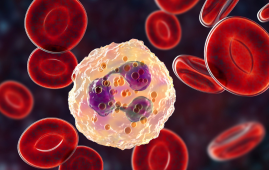

A recent study finds that cerebrospinal fluid affects current treatment efficacy in brain cancer while also identifying novel therapeutic prospects.
Cerebrospinal fluid, the clear colorless liquid that protects the brain, may also be a factor in brain cancer resistance to therapy, according to Australian researchers led by Associate Professor Cedric Bardy from SAHMRI and Flinders University, who published their findings in the journal Science Advances.
The study, published in the high-profile journal Science Advances, explains how a decades-old anti-anxiety medicine can boost the effectiveness of chemo-radiotherapy against glioblastoma, or GBM, the most prevalent and fatal brain cancer.
Brain cancer kills more children and adults under the age of 40 than any other type of cancer. They are resistant to treatments that kill malignancies in other parts of the body. The study team speculates that this could be due to distinct brain traits.
The Australian team of neurobiologists, neurosurgeons, and oncologists investigated the influence of the valuable resource of human CSF fluid on the growth of tumor cells obtained from 25 local glioblastoma patients.
Among their discoveries was that the tumor cells quickly changed their identity and grew more resistant to radiation and the medicine temozolomide, both of which are standard treatments for glioblastoma.
Associate Professor Cedric Bardy says, “Glioblastoma kills so many people who are otherwise fit, healthy and young, within months. This is a horrible disease, and the treatments available are just not effective enough despite serious side effects.
“This study helps us understand the limitations of the current chemotherapies and provides new hope for repurposing a class of drugs that could be added to the standard of care. We are working hard now to try this on patients in a clinical trial.”
The researchers discovered that glioblastoma cells exposed to cerebrospinal fluid were more resistant to ferroptosis, a type of therapy-induced cell death.
Importantly, they demonstrated that trifluoperazine, a long-used anti-anxiety medication, might re-sensitize glioblastoma cells to both therapy. Trifluoperazine, on the other hand, was shown not to affect healthy brain cells. The researchers concluded that adding trifluoperazine with normal therapy may increase the survival of GBM patients.
more recommended stories
 Silica Nanomatrix Boosts Dendritic Cell Cancer Therapy
Silica Nanomatrix Boosts Dendritic Cell Cancer TherapyKey Points Summary Researchers developed a.
 Vagus Nerve and Cardiac Aging: New Heart Study
Vagus Nerve and Cardiac Aging: New Heart StudyKey Takeaways for Healthcare Professionals Preserving.
 Cognitive Distraction From Conversation While Driving
Cognitive Distraction From Conversation While DrivingKey Takeaways (Quick Summary) Talking, not.
 Fat-Regulating Enzyme Offers New Target for Obesity
Fat-Regulating Enzyme Offers New Target for ObesityKey Highlights (Quick Summary) Researchers identified.
 Spatial Computing Explains How Brain Organizes Cognition
Spatial Computing Explains How Brain Organizes CognitionKey Takeaways (Quick Summary) MIT researchers.
 Gestational Diabetes Risk Identified by Blood Metabolites
Gestational Diabetes Risk Identified by Blood MetabolitesKey Takeaways (Quick Summary for Clinicians).
 Phage Therapy Study Reveals RNA-Based Infection Control
Phage Therapy Study Reveals RNA-Based Infection ControlKey Takeaways (Quick Summary) Researchers uncovered.
 Pelvic Floor Disorders: Treatable Yet Often Ignored
Pelvic Floor Disorders: Treatable Yet Often IgnoredKey Takeaways (Quick Summary) Pelvic floor.
 Urine-Based microRNA Aging Clock Predicts Biological Age
Urine-Based microRNA Aging Clock Predicts Biological AgeKey Takeaways (Quick Summary) Researchers developed.
 Circadian Control of Neutrophils in Myocardial Infarction
Circadian Control of Neutrophils in Myocardial InfarctionKey Takeaways for HCPs Neutrophil activity.

Leave a Comment